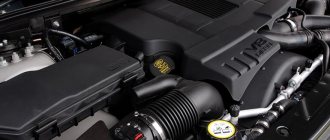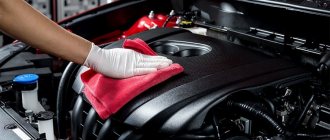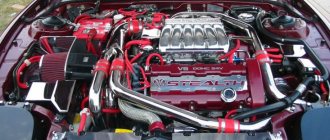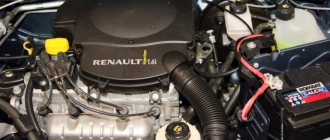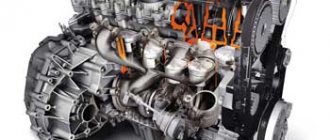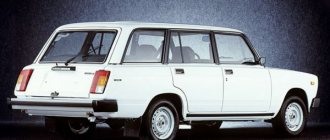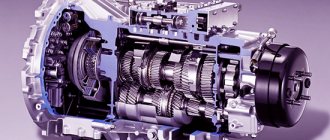It's no secret that in the CIS countries, vehicles with a diesel engine are often associated with heavy trucks, special equipment, buses and commercial vehicles. As for passenger cars, diesel in such cars is more rare than the norm.
At the same time, global trends demonstrate the steadily growing popularity of this type of internal combustion engine. Moreover, in developed countries there is an active replacement of conventional gasoline engines with diesel analogues.
It is quite obvious that there are quite good reasons for this, which persuade prudent foreigners to buy a diesel car. In this article we will look at the main pros and cons of a diesel engine, and also talk about in what cases this type of engine can or, on the contrary, cannot be considered the optimal choice.
Fundamental differences
In the combustion chamber, the atomized diesel fuel detonates (self-ignites) when compressed. The fuel mixture containing gasoline is ignited by a spark. In the first case, higher pressure is created in the cylinder. Exhaust gases (exhaust) are colder. The fuel burns more slowly, the detonation delay is determined by the cetane number (the norm is 45...55). All this affects the most important performance characteristics of the motor:
- power;
- efficiency;
- dimensions and weight, etc.
The pros and cons of a diesel engine are also determined by the characteristics of the fuel itself. The more efficiently the combustible mixture can be compressed in the cylinder. The octane number shows the resistance to detonation of gasoline. This indicator is not standardized for diesel fuel. Gasoline is flammable, volatile, and its exhaust contains more CO2. Diesel fuel is more difficult to ignite with an open flame, it evaporates less and freezes faster (in summer). It has a higher density - a plus when paying per liter. Exhaust gases contain soot, nitrogen oxides, and hydrocarbons.
This is interesting: Cardan shaft crosspiece - when does it need attention?
Advantages
The advantages of a diesel engine over a gasoline engine include:
- Fuel consumption . Modern diesel power units are 30%-35% more economical than analogues
- Environmentally friendly. The design of diesel equipment implies the most efficient combustion of a portion of fuel. This feature provides a significant reduction in exhaust toxicity.
- High torque . Diesel power plants are characterized by stable traction from the lowest revs. The stability of torque makes it possible to ensure confident acceleration dynamics even when using a turbine.
- Long service life . Subject to correct servicing, diesel units travel up to 350 thousand km-400 thousand km, while the average mileage of gasoline engines is about 200 thousand km.
- High efficiency . The design features of the diesel unit ensure that the maximum amount of energy is obtained from each portion of burned fuel and that the useful power of the engine is fully realized.
- Simplified design . The absence of spark plugs in a diesel power unit fundamentally eliminates a number of problems inherent in gasoline engines (breakdown of armored wires, unstable spark, etc.). In addition, there is no need to periodically replace electrical components (spark plugs, ignition coils, etc.).
Poor starting and poor performance at low temperatures. 20% true
“Behind the Wheel” conducted a comparative cold start test of diesel and gasoline engines. These were the petrol Kia Rio 1.6 and the Kia Sorento Prime with a 2.2-liter turbodiesel (both cars were fresh, with minimal mileage). It turned out that both engines start at -33°C and do not come to life at -36°C.
The Korean crossover in the freezer confirmed its high starting qualities at low temperatures.
The Korean crossover in the freezer confirmed its high starting qualities at low temperatures.
But, as always, operational factors influence success. The tests were carried out on brand new cars, and winter fuel was used and from a branded gas station. Diesel engines are more likely to fail to start in cold weather due to fuel, especially at the beginning of winter when gas stations may be out of grade. Also, over the years, glow plugs may fail, the mandatory operation of which is necessary for starting even at low sub-zero temperatures.
Also, a diesel engine, due to the high degree of compression in the piston part, as well as due to more durable and massive parts, requires an impeccable condition of the battery to effectively crank the crankshaft with the starter. Accordingly, in winter, a non-new battery is more likely to disrupt the trip of a diesel driver than for its counterpart operating a car on gasoline.
Diesel car: pros and cons
Stereotypical thinking forces people to divide motorists into “snowdrops”, “dummies”, “racers”, “turtles”, “monkeys”, into those who love “mechanics” or prefer “automatic”. Or, for example, to “diesel drivers” and “gasoline drivers”.
Disputes often arise between the latter: whose preferences are more correct? And whose car’s “heart” beats hotter, especially in winter? And in general: is it worth buying a diesel car in Russia?
Sometimes convinced owners of cars with gasoline engines paint a terrible picture. They say that a “diesel” is a noisy monster, capricious in nutrition, which will leave its owner without the ability to move in severe frost. But any car enthusiast who gets behind the wheel of a diesel car is sincerely surprised by the fuel consumption. The needle of the fuel level sensor does not creep so slowly even in a super-modern and super-economical gasoline unit (naturally, for comparison it is necessary to take compatible engine power and displacement parameters). But even steadily rising fuel prices cannot become the determining parameter when choosing a diesel engine. Meanwhile, many diesel owners swear by their choice for life.
Secrets of love
People don't fall in love with diesel right away. It should take not just a few dates with it, but several years of use. There are quite enough reasons to connect your life with a diesel car:
1. First of all, the low fuel consumption is captivating (it is almost 30% less compared to a gasoline engine). You will immediately notice that you have become a rare guest at the gas station. By the way, your pump will be free more often than others, because the overwhelming majority of Russian motorists still drive on gasoline.
2. Even if you are not the biggest environmentalist, you will feel the environmental friendliness of diesel for yourself. Modern diesel fuel has minimal vapor volatility, low toxicity, and ignition of the fuel is unlikely, unlike gasoline. Accordingly, your diesel engine cares not only about nature, but also about the health of its owners and passengers.
3. A diesel engine is like a long-lived and hardy horse. After all, the parts of its gasoline counterpart wear out faster. For example, a diesel engine does not require an ignition system and spark plugs (since the self-ignition of the fuel-air mixture occurs differently than in a gasoline engine).
4. The structural features of a diesel engine provide the possibility of greater air compression than in a gasoline engine. Diesel also has a higher efficiency - that is, it converts a larger percentage of fuel energy into useful work. And this, in turn, affects the increase in power.
but on the other hand
However, owners of gasoline engines in Russia are not always ready to give up the usual type of fuel for the sake of subsequent savings. And there are good reasons for this.
For example, although a diesel car needs refueling less often, in Russia you need to approach the choice of fuel and gas station carefully and carefully. This is especially true in the winter. After all, there are several types of diesel fuel - summer, winter and off-season. Unfortunately, some gas stations practice selling summer fuel at “winter” prices. At the same time, it is unlikely that it will be possible to distinguish fuel types by color and consistency right at the gas station. (For reference: winter fuel has a lower paraffin content, this allows it not to become cloudy or thicken at low ambient temperatures, and, accordingly, maintain fluidity and the ability to pass through the fuel filter, ensuring normal engine operation).
Often, the unreliability of fuel forces diesel engines to use anti-gels, which lower the pour point of the fuel. It would seem that this is the key to successful operation of a car in the cold season. But if the car is under warranty, then the use of additives can play a “disservice” and make it impossible to get warranty repairs.
There is also an opinion among car enthusiasts that in cold weather, due to the peculiarities of starting a diesel engine, the car may simply not start. But we must keep in mind that modern diesel engines have quite powerful starters and batteries, and are also equipped with glow plugs. All this, coupled with low-viscosity engine oil, almost guarantees a successful start of a modern diesel car. Unless this can be prevented by a clogged fuel filter, which on a diesel engine may have to be changed much more often than on a non-gasoline car.
But there are also stereotypes about diesel cars that are rapidly becoming a thing of the past. The rumbling bass of a diesel engine threatens to become a legend of the last century; diesel engines are becoming quieter, more rhythmic, and more intelligent. Among the newest generation of Opel cars, so-called “whispering” diesel engines have appeared - their internal and external noise is in some cases even lower than the noise of gasoline engines.
Prices for spare parts for modern diesel cars, in principle, do not differ significantly from the cost of repairing a gasoline car, and with the growing popularity of diesel engines, there are more and more professional repair specialists. The power of diesel and gasoline engines is about to begin a fierce battle thanks to the continuous development of technology.
Eternal dispute
They say that truth is born in dispute. But in the event of a dispute between “diesel drivers” and “gasoline producers”, good argumentation by the conflicting parties is not enough. There are pros and cons to the operation of both engines, and it is rather reckless to zealously defend a gasoline engine without trying at least once in your life to enjoy the high fuel economy and smooth running of a diesel car.
Well, in the meantime, diesel drivers in our country can still enjoy the absence of queues at their pump, share the addresses of gas stations with reliable winter fuel, and feel like a special minority who have learned the secrets of the pleasure of owning a diesel car.
Photo: ITAR-TASS/ Artem Korotaev.
Diesel saves money. 50% fair
Diesel actually uses less fuel to produce a unit of power. And, it would seem, it should lay down its gasoline competitor. But, firstly, in the Moscow region, good diesel fuel, especially in the winter season, surpasses the price of 95-grade gasoline, and even more so the budget 92-grade gasoline. In cold weather, a diesel engine needs either a preheater, which also draws diesel fuel from the tank, or frequent autostarts based on temperature. Diesel is usually heated for a long time and is never turned off in winter during short parking periods. To eliminate the possibility of untested fuel freezing, anti-gels have to be added to the fuel tank, the purchase of which also worsens the economic balance. So, you may be able to save on fuel, but in general, taking into account the additional costs, operating a diesel engine can be even more expensive than a gasoline car.
Diesel cars are characterized by strong noise and vibration. 25% true
The tractor sound and strong vibrations felt throughout a diesel-powered vehicle are a thing of the past. This is how cars imported from Europe in the 90s of the last century behaved. The generation of engines was different, and most importantly, they were worn out to the limit.
Vibrations can be felt inside a modern diesel car, mainly at idle, and a rumble during intense acceleration. And so - everything is quiet, almost like with a spark-ignition engine. Outside, if there is no strong extraneous noise around, the human ear will immediately identify a car running on heavy fuel. And, of course, it all depends on two main factors: the class of the car and its age. Expensive cars carry numerous layers of vibration and noise insulation and have effective vibration-absorbing mounts for the power unit. And with age, everything begins to work worse, including the diesel engine itself, which, when worn out, makes more noise and vibrates more.
What are the nuances of a diesel engine?
Until recently, due to the fact that diesel fuel was almost half the price of gasoline, the shortcomings of such an engine were overlooked, because cheap fuel was combined with its low consumption and excellent traction capabilities of the car.
The main disadvantages were increased noise, strong vibration load and low acceleration dynamics.
Now the situation has changed radically, and good diesel fuel, despite the fact that it is actually a by-product of oil refining, is more expensive than gasoline. In addition, the diesel engine itself is significantly more expensive and more difficult to operate and maintain than a gasoline engine.
With this balance of factors, the choice is no longer limited to a measured, economical drive or a dynamic, but slightly more fuel-efficient one. The very fact of the advisability of purchasing a car running on diesel fuel is questionable, because despite the enormous work aimed at eliminating its weak points, some of the shortcomings still could not be eliminated.
We will not consider in this article freight vehicles, for which the most important indicator is traction at high loads, as well as efficiency, since the majority of commercial fleets do not offer gasoline versions at all. This is due to the fact that a large-volume diesel engine under high loads is much preferable to its gasoline counterpart in terms of efficiency. After all, when we are talking about fuel consumption of tens of liters per hundred kilometers, even minor savings look impressive in monetary terms.
In addition, for such cars, driving at high speeds is not necessary at all. At maximum load, a gasoline engine is prone to a significant increase in fuel consumption; a diesel engine in this situation is more stable.
This is interesting: Engine crankcase ventilation - why is it needed?
Which is better - diesel or gasoline engine?
Before buying a car, many people begin to carefully study manufacturers, models and reviews about them. At first glance, two cars of the same model can behave completely differently under the same operating conditions. And the difference between them lies in the power unit, hence the question arises, which engine is better, diesel or gasoline?
Each driver has his own criteria for choosing an engine
A car with a gasoline engine costs up to 30% less, and this is a very attractive argument. However, if you think about it, diesel fuel costs 15 percent less than gasoline. And in addition, manufacturers also claim that fuel consumption on a diesel engine is much more economical. But this is where independent discussions on the topic of how one engine differs from another most often end.
Some people resort to seeking advice from friends who have been driving cars for several years and can suggest what is best. Here the recommendations of experienced drivers differ radically. Someone will say that starting a diesel unit in cold weather is an unrealistic task, but refueling with low-quality fuel will immediately take you to the service station and cost you a lot of money. Someone will speak positively about diesel engines, but about gasoline units they will say that their consumption is high, minor breakdowns constantly occur, etc.
To make the right choice, you must know the advantages and disadvantages of each type of power unit. This will help you choose the right engine for your operating conditions and remain satisfied with your purchase.
Development ways
Innovation of the diesel engine lies in the evolution of fuel equipment.
The designers' efforts are aimed at achieving precise injection timing and maximum fuel atomization. Creating a fuel “fog” and dividing the injection process into phases made it possible to achieve greater efficiency and increased power.
The most archaic examples had a mechanical injection pump and a separate fuel line to each injector. The engine design and TA of this type were highly reliable and maintainable.
The further path of development was to complicate the fuel injection pump of a diesel engine. It introduced variable injection timing, many sensors and electronic process control. In this case, the same mechanical nozzles were used. In this type of design, the fuel injection pressure was between 100 and 200 kg/cm².
The next step was the introduction of the Common rail system. The diesel engine now has a fuel rail where pressure can be maintained at up to 2 thousand kg/cm². The fuel injection pumps of such engines have become much simpler.
The main design difficulty lies in the nozzles. It is with their help that the torque, pressure and number of injection stages are regulated. Battery-type system injectors are very demanding on fuel quality. Airing such a system leads to rapid failure of its main elements. The common rail diesel engine is quiet, consumes less fuel and has more power. You have to pay for all this with fewer resources and higher repair costs.
Even more high-tech is the system using pump injectors. In a TA of this type, the nozzle combines the functions of pressurizing and atomizing fuel. The parameters of a diesel engine with pump injectors are an order of magnitude higher than analog systems. However, so are the cost of maintenance and requirements for fuel quality.
Minuses
Analyzing the disadvantages, it is worth noting that there are many more of them, but they are less significant than the advantages. The disadvantages include:
- Fuel . In order for the engine to work efficiently and not fail for a long time, the fuel must be of high quality and meet the manufacturer’s requirements. Sometimes it is very difficult to find a gas station in an accessible location with fuel of the required quality, which is why you have to travel extra kilometers. It is worth noting that if you contact the service during the warranty period, the first thing they will do is check the quality of the fuel in the tank. If it does not meet the necessary requirements, repairs will have to be done at your own expense. Also a problem is the solidification of fuel at low temperatures , which is especially important in our country, this is due to the presence of a large amount of paraffins in the composition. Therefore, in winter you need to refuel with special winter fuel, which is more expensive. At the same time, it is impossible to distinguish high-quality and low-quality diesel fuel by appearance.
- Price . If you compare two types of cars with the same power and the same equipment, a diesel one will almost always be more expensive.
- Optional equipment . Given the difficulties with operating a car in cold weather, the use of additional equipment and accessories is required. Sometimes an additional interior heater is required, since the factory one may not cope with its functions. It is also sometimes necessary to purchase and install a heated fuel separator.
- Insurance . The cost of insurance is calculated as a percentage of the cost of the car, which is why CASCO for diesel models is more expensive than for gasoline ones.
- Service . It is also worth noting that maintenance is much more expensive, but only if you use low-quality diesel fuel. If you maintain your car properly, it will break down much less often. It is worth considering many factors and not skimping on oil and consumables, the cost of which is much lower than the cost of repairing a serious breakdown.
Advantages of a diesel engine
Saving on fuel
This includes both the lower cost of diesel fuel itself compared to gasoline and its economical engine consumption. Due to its high density, the efficiency of diesel fuel is higher than that of gasoline by an average of 25% , which, in fact, increases its efficiency.
Fuel costs are also reduced by direct injection into the combustion chamber, whereas in gasoline engines the fuel must pass through the intake manifold to form an air-fuel mixture. And, accordingly, another additional advantage is that a diesel car travels a greater distance from refueling to refueling.
More torque
This advantage of the diesel engine contributes to its better performance in city driving conditions with already familiar traffic jams, when you need to stop and move on often.
The efficiency is expressed in the fact that the car accelerates faster, especially if the engine is reinforced with a turbocharger. It is because of the excellent traction of diesel engines that trucks are equipped with them. The advantage of diesel engines in terms of torque, which is most clearly felt at low speeds, is ensured due to the strong compression in the combustion chamber, which is necessary for the self-ignition of diesel fuel.
Environmental friendliness
When operating a diesel engine, where self-ignition of the fuel occurs due to air compression (temperatures reach 800°C), less carbon dioxide is released into the environment compared to a gasoline-powered engine.
According to research by scientists, the share of emissions from diesel engines in the urban environment is four times less than waste from gasoline internal combustion engines. The bulk of diesel engine emissions come from soot, sulfur and nitrogen oxide, which can be easily filtered out.
Durability
Among the differences between a gasoline engine and a diesel engine, one can also mention the lower speed of the latter. The maximum value for this parameter is 6000 rpm, whereas for a gasoline engine it is 9000 rpm. This, in turn, affects the mileage of the car.
The larger operating range of gasoline engines leads to faster wear of parts - a car can usually travel 350,000 km before overhaul. Cars with diesel engines are sometimes able to travel more than 1 million km before a critical breakdown is detected.
The evolution of the diesel engine
As is known, at the initial stage, power units of this type could not adequately compete with their gasoline counterparts. The fact is that diesel remained a high-torque and economical engine for a long time, but was slow-moving.
In practice, this means that such an internal combustion engine confidently pulled from the very bottom, but there was no talk of high revolutions and, accordingly, high speeds. At the same time, the main advantage remained the low consumption of diesel fuel (diesel fuel) and high torque at low speeds. This solution was optimal for commercial vehicles, but was not suitable for passenger vehicles.
If we add noise and increased vibrations to this, then it becomes clear why diesel engines were not in demand in passenger cars. However, over the past 30 years the situation has changed radically. Given the decline in oil reserves, tightening environmental standards and the constant rise in fuel prices, fuel consumption has come to the fore.
Automakers began to actively implement the latest developments; the diesel engine received an upgraded fuel injection system and turbocharging. As a result, it was possible to almost completely get rid of noise and vibration, and also bring diesel closer to gasoline engines in a number of performance indicators.
Some cars can only be purchased with diesel. Is it true
Some models can be purchased in our country only with a diesel engine. This often happens because only diesel modifications have tax-effective power of up to 250 hp. For example, Audi Q7. Although the luxurious SQ8 is also equipped with a 422 hp diesel engine.
The premium cross-coupe SQ8 from Audi is equipped only with diesel engines.
The premium cross-coupe SQ8 from Audi is equipped only with diesel engines.
Diesel is easier to maintain; you don’t even need to change spark plugs. Not true
Most automakers require more frequent engine oil changes in diesel engines. The oil volume is also usually larger. Filters - oil and air - are more expensive. Fuel requires relatively frequent replacement and maintenance. And according to the regulations, there is no need to change spark plugs. But if such a glow plug burns out, which is quite likely when the mileage reaches 100,000 km, then the price of one can approach 8,000 rubles and replacement will most likely be very difficult. Right up to drilling. If the fuel quality is poor, the power supply system will require replacement of the injection pump and injectors. This work is very expensive.
How to properly operate diesel engines
As for the end consumer, it is important for him to remember the main nuances of diesel, such as the use of different types in winter and summer. The fact is that diesel fuel thickens at subzero temperatures and the resulting gel-like mass can simply clog the fuel system and even damage it, so before the cold weather sets in, diesel fuel with special additives is delivered to gas stations.
This is important to remember for those who rarely use a car, because having refueled in the warm season, you won’t be able to leave in the winter. To do this, you will have to purchase additives and add them to the tank yourself. The old technology of adding a small amount of kerosene to summer diesel fuel can be detrimental to a modern engine.
Winter operation of a diesel engine is also associated with the fact that its extremely slow warming up does not allow the standard heating system to quickly heat up the interior. For cars with a large interior, as well as for SUVs and station wagons, this leads to the need to install an auxiliary heater.
Don’t forget that you need to closely monitor the fuel level, because if you run out of gasoline, you just need to add it to the tank, but in the case of a diesel engine, air gets into the system, which will not allow you to start the engine without special pumping.
Unlike older models, modern diesel engines are extremely sensitive to fuel quality, and inattention to this fact can lead to much more expensive repairs than in the case of gasoline engines.
Against this background, the most insignificant drawback of a diesel engine is its rather narrow operating range, which actually results in the need to change gears more often. Of course, in the case of an automatic transmission this fact becomes invisible, but the need for more gears is obvious.
A modern diesel engine is literally packed with various electronic systems, so servicing should only be carried out at an authorized center. In addition, for these engines, working fluids must be replaced almost twice as often.
For many car owners, safety is an important factor. Diesel fuel is extremely difficult to ignite and is not prone to spontaneous combustion or explosion, so if the fuel tank leaks as a result of a serious accident, the risk of a fire is extremely low.
Cause-and-effect relationships
As you know, a systemic problem automatically leads to a chain of consequences. In this regard, we list more detailed and specific “cons” of the diesel engine.
- Overall noisier operation.
- A priori, the average cost of spare parts is more expensive.
- More frequent and costly maintenance (including changing oil and other working fluids).
- Due to the slow heating of the spacious interior in winter, it is necessary to install an autonomous heater.
- A narrow operating range requires a larger number of gearbox stages compared to a vehicle running on gasoline.
- Absolute emptying of the fuel tank is inadmissible (entry of air at best can lead to pumping, at worst – damage).
- Due to loss of power due to clogging of fuel lines, exhausts, filters, it is less fast compared to a gasoline unit.
- There is a relatively high probability of failure of the high pressure fuel pump and injectors. This threatens repairs that will cost at least 30% of their original cost. Or replacement, and fuel equipment in diesel engines is not cheap (up to 25% of the price of the car). The service life of injectors and injection pumps depends on the degree of their manufacturability, as well as the product brand (Bosch, Delphi, Denso, Siemens, etc.).
- A competent diesel operator is still considered a rarity in the Russian outback, and an amateur will not undertake the complex design of a modern diesel engine along with the fuel system.
Despite rumors, diesel engines are subject to overhaul no worse than gasoline engines. Another thing, you should keep in mind that if we are talking about a used car, which the owner intends to use again, then you will have to tinker with certain types of cylinder block.
The fact is that sometimes there are products where the block and the head are combined in a one-piece, non-separable structure. This forces you to look for specialized workshops that will undertake to make the appropriate groove. The question is not an idle one, because even in regional centers, not every workshop has the proper machine tool potential.
Is it worth buying
New diesel cars are the type of purchase that will only bring joy. By filling your car with high-quality fuel and doing maintenance in accordance with regulatory requirements, you will 100% not regret the purchase.
But it is worth considering the fact that diesel cars are much more expensive than their gasoline counterparts. You will be able to compensate for this difference and subsequently save only when you cover a large mileage. Overpay in order to drive up to 10 thousand km per year. It's simply not practical.
The situation with used cars is a little different. Despite the fact that diesel engines have a large margin of safety, over time, complex fuel equipment requires increased attention. Prices for spare parts for diesel engines over 10 years old are truly depressing.
The cost of a fuel injection pump for a budget B class car 15 years old may shock some car enthusiasts. The choice of a car with a mileage of over 150 thousand should be taken very seriously. Before purchasing, it is better to do a comprehensive diagnosis in a specialized service. Since the low quality of domestic diesel fuel has a very detrimental effect on the service life of a diesel engine.
In this case, the reputation of the manufacturer will help you decide which engine to choose. For example, the Mercedes-Benz OM602 model is rightfully considered one of the most reliable diesel engines in the world. Buying a car with a similar power unit will be a profitable investment for many years. Many manufacturers have similar “successful” power plant models.
Lower cost of ownership
Some may argue with this advantage, since in some cases the cost of maintenance and repair of diesel cars significantly exceeds the cost of maintenance of gasoline cars. And this is truly an indisputable fact. But overall, the cost of owning a diesel car is significantly less than its gasoline counterpart. Especially in those markets where there is an increased demand for diesel cars. The fact is that the cost of ownership must always take into account the loss of the market value of the car on the used market and the natural wear and tear of spare parts during the operation of the vehicle. As a rule, diesel cars lose value much more slowly than their gasoline counterparts. Also, due to more durable engine parts, diesel cars have a longer service life, which of course allows you to spend significantly less money on car repairs.
So in the long term (from 5 years and above), owning a diesel car is more profitable than a gasoline one. However, it is worth noting that the cost of diesel models is usually much higher than gasoline ones. But if you own the car for a long time and drive 20,000-30,000 km per year, then this overpayment will pay off due to fuel savings.
Myths and misconceptions
Despite the prevalence of diesel cars, there are still prejudices and misunderstandings among the people. “It rattles, it doesn’t heat up in winter, and you can’t start it in very cold weather, it doesn’t run in summer, and if something breaks, you still need to look for a repairman who will repair everything for a lot of money,” these are the words you can sometimes hear from “experienced” people. car enthusiasts. All these are echoes of the past!
- Thanks to modern technology, only the rumble of idle speed can distinguish diesel engines from gasoline ones. When driving, when road noise increases, the difference is not noticeable.
- To improve starting and warming up in cold weather, modern cars use various auxiliary systems. Due to its growing popularity, the number of services specialized in servicing diesel engines is constantly increasing.
- There is an opinion that it is difficult to boost an internal combustion engine running on diesel. This is true if we are talking about modifications of the cylinder-piston group. At the same time, chip tuning of a diesel engine is a good way to increase its power characteristics without compromising its service life.
It is worth remembering that the operating principle of a diesel engine is entirely aimed at achieving efficiency and reliability. You should not demand sky-high dynamic performance from such internal combustion engines.
Symptoms and causes of malfunctions
- Poor starting of a diesel engine when cold, and after a long period of inactivity, means poorly functioning glow plugs, air in the system, a check valve releasing fuel pressure, poor compression, a discharged battery;
- increased noise, increased consumption and black smoke from the exhaust pipe - means clogged or worn sprayers and injectors, incorrect injection timing, dirty air filter;
- loss of diesel engine power means lack of compression, turbine failure, clogged fuel and air filters, incorrect injection timing, dirty USR valve;
- gray or white smoke from the exhaust, increased oil consumption - means a cracked cylinder head or a broken cylinder head gasket (coolant leaks out and an emulsion appears in the oil), a malfunction of the turbocharger.
Correct operation
Improper operation can destroy even the most reliable motor.
Following simple rules will help you extend the life of your diesel engine and enjoy car ownership:
- Turbocharged diesel engines are very demanding on the quality of oil and fuel. Fill only with oil that meets the requirements established for your internal combustion engine. Refuel only at proven gas stations;
- Carry out maintenance of fuel equipment and preheating systems in accordance with the standards stated by the manufacturer. In this case, you will not have problems starting the diesel engine in the cold season. Operating the unit with a malfunctioning nozzle can subsequently lead to costly repairs to the internal combustion engine;
- After active travel, the turbine needs cooling. Do not turn off the engine immediately. Let it idle for a while;
- Avoid push starting. This method of reviving the engine can cause great harm to the crank mechanism of your internal combustion engine.
Both types of engines have not only pros, but also cons. The main purpose of a car is to meet your requirements, no matter if it has a petrol or diesel engine. What is best for you depends only on individual preferences.
Today's innovative technology and progressive marketing allow people to choose from cars that they can afford. We have to compromise and sacrifice individual parameters less and less. This trend is especially noticeable in the evolution of diesel cars.
Flaws
Diesel engines have both advantages and specific disadvantages.
Pricing.
Depending on the class and type of car, diesel vehicles cost on average 25%-35% more than their counterparts with gasoline power units. At the same time, on the secondary market the price of such cars drops significantly and it is practically impossible to maintain the same initial markup of 25%-35% in relation to the gasoline analogue.
Requiring maintenance.
Taking into account the quality of fuel and operational features in the CIS countries, diesel units require more frequent replacement of filters and oils. Compared to gasoline engines, actual service intervals for such engines are reduced by 40%-50%. The presence of high-tech injection systems places much more stringent demands on the quality of the work performed and the process fluids themselves. Even one refueling with the wrong fuel can damage expensive equipment.
Specific dynamics.
Diesel power units are on average heavier than gasoline units of similar power, which directly affects the vehicle’s weight distribution and its handling. In addition, this type of engine requires the driver to work more actively with the transmission, which is subject to the loads of high torque. If the power unit is equipped with a robotic or automatic transmission, its service life may be lower than that of a similar assembly with a gasoline internal combustion engine.
Warm-up duration.
The high efficiency of the power unit leads to the fact that during its operation less energy is consumed on heat. Thus, with significant performance, allowing short trips around the city, the engine simultaneously remains “cold” almost throughout their entire duration, as a result of which its service life is reduced. It is necessary to take into account that it is possible to warm up a diesel engine only under moderate load; keeping it at idle will not allow the unit to reach the operating temperature range.
The need to use seasonal fuel.
One of the features of this type of fuel is its ability to become waxy as the ambient temperature drops, which leads to difficult starting in cold periods. To prevent this, appropriate additives are added to the mixture. In addition, in regions with low winter temperatures, diesel equipment is often retrofitted with preheating systems. In addition, the condition of the glow plugs, which warm up the combustion chamber before starting the engine, is also of great importance.
Is the gasoline engine a worthy predecessor?
Like a diesel engine, a carburetor engine is an internal combustion engine that uses various brands of gasoline to operate. They, in turn, are distinguished by their purity, detonation resistance, and so on. Fuel is supplied by gasoline pumps with a mechanical or electric drive (the latter are installed on injection engines).
The main advantage of gasoline engines is their ability to start in almost any frost. Unlike diesel fuel, gasoline does not turn into pudding at sub-zero temperatures. And to heat it up, you won’t need to install expensive heating equipment, which only recently reached the required level of reliability and became available to everyone.
It would seem that, due to their advantages, gasoline engines should have supplanted diesel engines long ago, but, oddly enough, the number of cars running on diesel fuel is growing every year. What could it be: a tribute to fashion or a truly higher quality of operation of such engines?
The advantage of a diesel engine over a gasoline engine – let’s evaluate it on its merits
Why is a diesel engine better than a gasoline engine? Let's start with its device. First of all, its superiority lies in economical fuel consumption, which is explained by a higher compression ratio, reaching 21 units, in contrast to 10 for a gasoline engine. With high and still constantly rising fuel prices, this argument becomes one of the decisive ones.
In addition, the same volume of air is supplied to each cylinder, and fuel consumption depends on the total load on the power unit. However, even at maximum speed it is lower than that of a carburetor, which is caused by more efficient use of the combustible mixture, which means the efficiency of the entire structure increases. This means not only saving you money, but also reducing the load on the environment in nature.
The advantages of a diesel engine over a gasoline engine are, first of all, a longer service life . It does not need frequent adjustment, but the stability of its operation depends on the level of resistance of the air filter and the accuracy of the fuel injection advance angle. And these parameters must really be checked often and carefully, only in this way all the advantages of a “diesel” will work for you.
Advantages and disadvantages
There are a number of factors that distinguish diesel engines:
- efficiency. An efficiency of 40% (up to 50% with the use of turbocharging) is simply an unattainable figure for its gasoline counterpart;
- power. Almost all the torque is available at the lowest revs. A turbocharged diesel engine does not have pronounced turbo lag. Such throttle response allows you to get real driving pleasure;
- reliability. The mileage of the most reliable diesel engines reaches 700 thousand km. And all this without tangible negative consequences. Due to their reliability, diesel internal combustion engines are used in special equipment and trucks;
- environmental friendliness. In the fight for environmental protection, the diesel engine is superior to gasoline engines. Less CO2 emissions and the use of exhaust gas recirculation (EGR) technology cause minimal harm.
Flaws:
- price. A package equipped with a diesel engine will cost 10% more than the same model with a gasoline unit;
- complexity and high cost of maintenance. ICE components are made of more durable materials. The complexity of the engine and fuel equipment requires high-quality materials, the latest technologies and great professionalism in their manufacture;
- poor heat transfer. A high percentage of efficiency means that during fuel combustion there is less energy loss. In other words, less heat is generated. In the winter season, operating a diesel engine for short distances will negatively affect its service life.
The considered pros and cons do not always balance each other. Therefore, the question of which engine is better will always arise. If you are going to become the owner of such a car, take into account all the features of its choice. It is your requirements for the power plant that will be the factor that will decide which is better: a gasoline or diesel engine.
The difference between diesel and gasoline is engine power and fuel consumption
The compression ratio of diesel is almost 2 times higher than that of gasoline, and therefore its efficiency is greater. The fuel mixture is regulated evenly, and as the speed increases, the amount of incoming diesel fuel also increases. However, at maximum speed, if we compare two units with the same displacement, the amount of injected diesel will be 30-50% less. Therefore, two cars of the same brand, different diesel and gasoline engines of the same size, can have significant differences in power.
It is difficult to say unequivocally that gasoline or diesel is better for a car. If the car owner is a supporter of the roar of the engine, a diesel engine will suit him. If you like to save money - a gasoline internal combustion engine.
If you have chosen a car with a gasoline engine, we recommend that you familiarize yourself with the current cost of gasoline in Russia.
